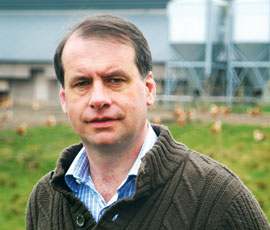Feed tracker contracts – the future for eggs

Robert Gooch, British Free Range Egg Producers Association’s policy director, argues it is time to up the ante on the way free-range producers are rewarded.
The spike in global feed commodity prices is hitting all livestock producers hard, but none more than free-range egg producers.
On some units feed is now making up 70% of total costs, equivalent to 70% of total income to producers who are breaking even, and the forecasts suggest that feed prices will continue to rise into the autumn. This will mean even more producers failing to cover costs and exiting the industry.
Increasing volatility in prices for global commodities, such as wheat and soya, are currently not reflected in prices paid for free-range eggs, meaning that producers carry all the risk. This should not be the case, particularly as most free-range units are relatively small businesses and are not as integrated in the supply chain as in the colony or broiler sectors. These sectors have mitigated feed price risk in many cases through feed tracker clauses in contracts.
The recent unrest in the milk sector has alerted us all to the benefits of cost-plus or feed tracker contracts. But there is little support within the industry for these types of contracts in free range, even though aligned contracts are commonplace in other sectors.
My challenge is to get all parts of the free-range supply chain to accept that feed tracker contracts are the way forward, to share risk fairly between operators throughout the chain.
Ironically, the lack of integration within production and packing, through to retail, makes it harder to get the message across, but the British Free Range Egg Producers Association (BFREPA) is working hard with the National Egg Marketing Association Limited (NEMAL) to bridge the gap through initiating a joint project on benchmarking costs.
Benchmarking is one element of an initiative that BFREPA put to NEMAL in July. The BFREPA website is to be amended to allow BFREPA, NFU members and NEMAL producers to enter their end-of-flock performance data online. This will allow units to analyse variations in performance between their own figures and the standard figures.
The numbers produced would feed into a database of standardised costings that could be agreed on by all in the supply chain, so as to form a basis for constructive discussions about a baseline for feed tracker or cost plus type contract clauses.
“My challenge is to get all parts of the free-range supply chain to accept that feed tracker contracts are the way forward, to share risk fairly between operators throughout the chain.”
Robert Gooch
This will take time to get off the ground and achieve its objective. In the meantime, planning has begun for a feed crisis campaign to raise awareness of our plight across all stakeholder groups – consumers, government and the supply chain. Visit #afairprice on Twitter and check out the general media.
It will not be a short campaign. But we have to make consumers aware that we are producing free-range eggs for them at a loss and we need a price increase to compensate for the high feed costs. The feed-tracker part of the campaign will emerge later when, working with the general media and consumers, we can tackle our customers up the supply chain.
A feed tracker clause in free-range egg contracts will happen – it is just a matter of when.
Join the discussion on feed ratchets for egg producers on our forum
